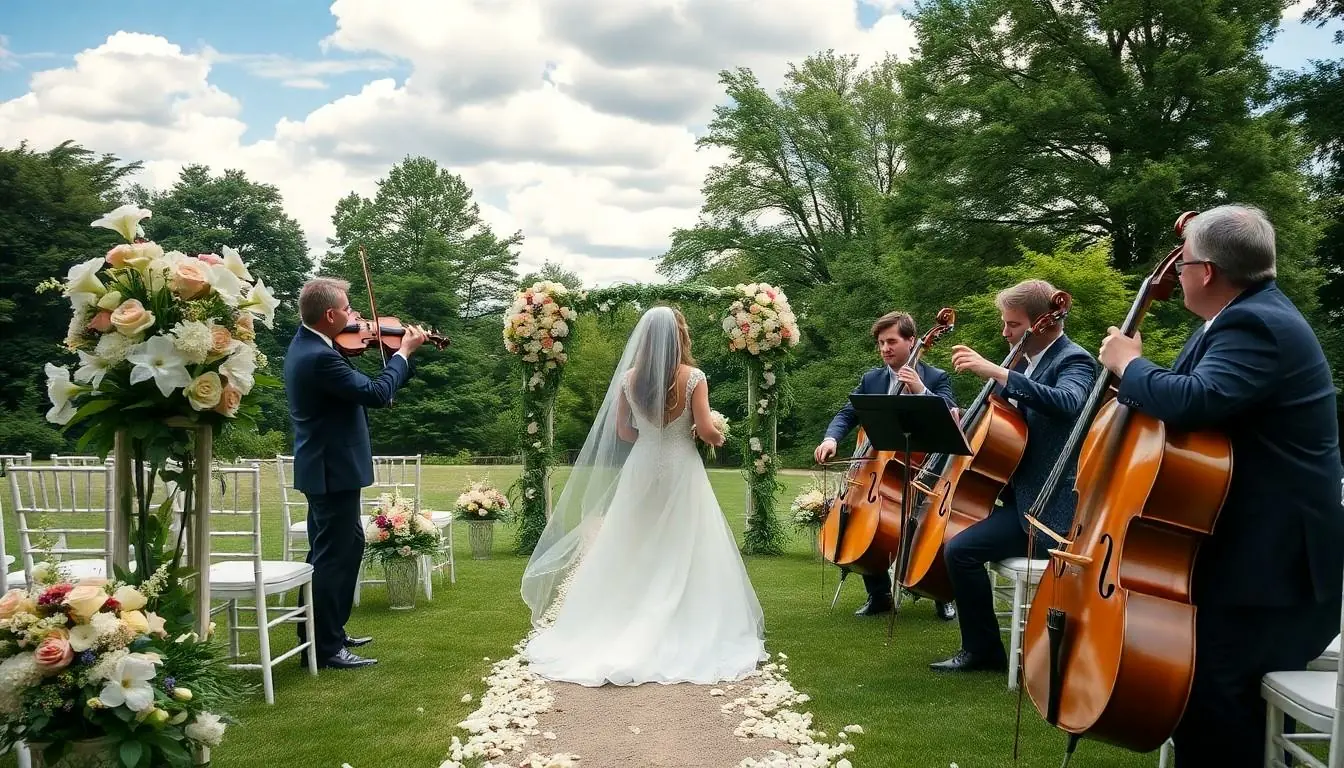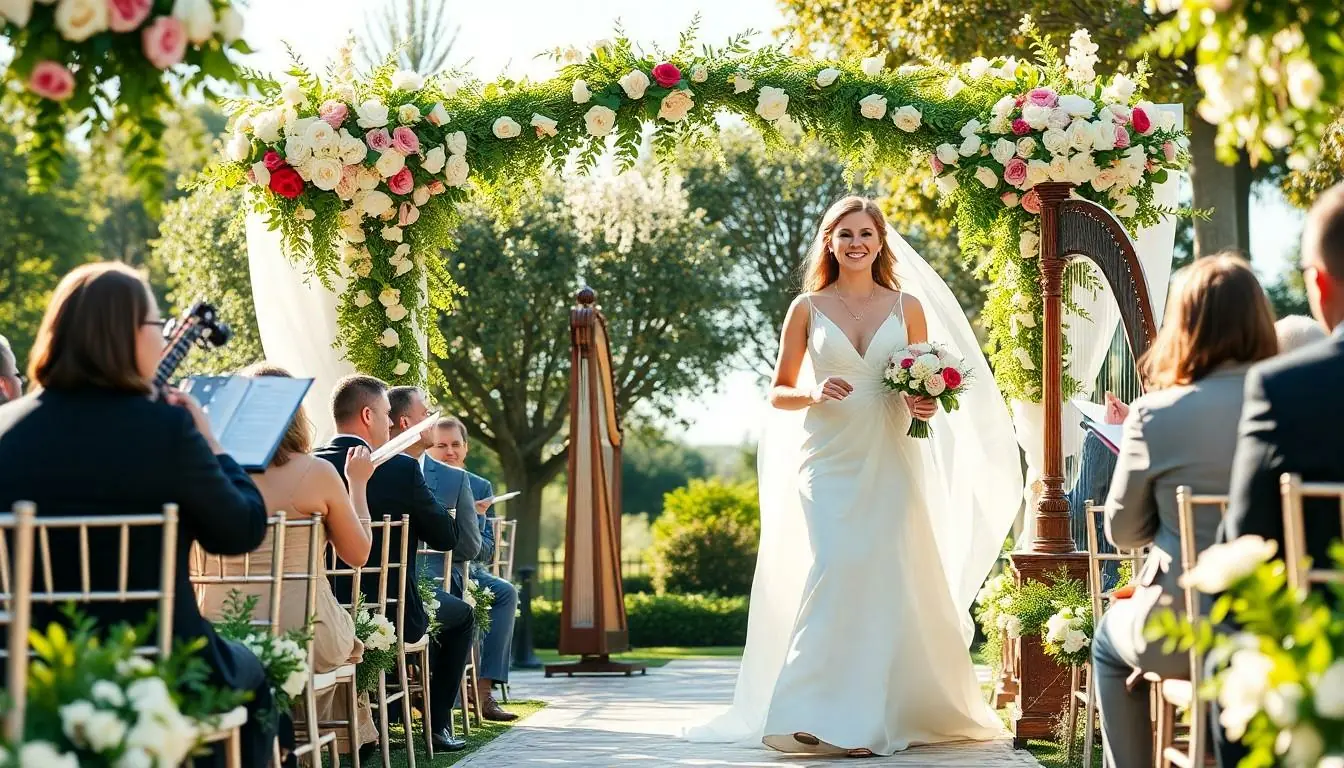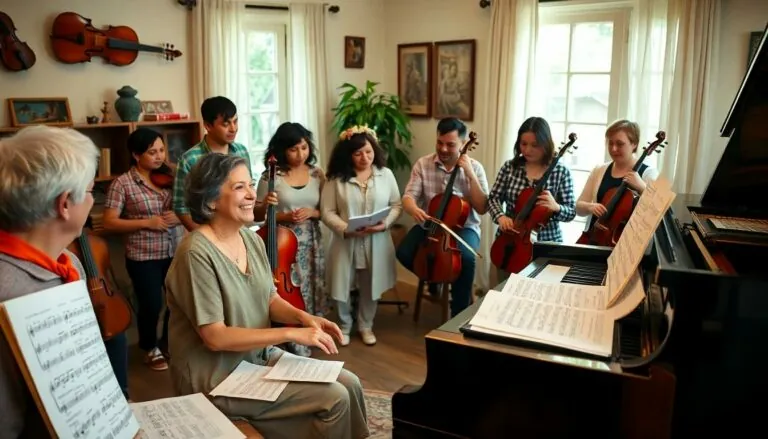Table of Contents
ToggleImagine walking down the aisle to the enchanting sounds of a string quartet, each note weaving a spell of romance and elegance. Classical music has a timeless charm that transforms weddings into unforgettable experiences. It’s not just background noise; it’s the perfect soundtrack for love stories unfolding in real-time.
Importance Of Classical Music For Weddings
Classical music plays a crucial role in weddings by creating a romantic atmosphere. Each note contributes to the emotional experience of the event. Couples often choose classical pieces to underscore significant moments, such as the wedding march or first dance.
Music sets the tone for the ceremony and reception, influencing guests’ moods. Selections from composers like Bach, Mozart, and Vivaldi resonate with elegance. Additionally, classical music forms an intimate backdrop that enhances personal connections during the celebration.
Enhancing the ceremony’s ambience, string quartets or solo violinists often perform. Weddings benefit from live performances, which elevate the overall experience. For instance, the serene sounds of a harp during a wedding ceremony can create a tranquil environment.
Classical music, with its timeless quality, symbolizes enduring love. Many couples select pieces that reflect their unique stories and backgrounds. The wide variety of classical compositions allows for personalization, catering to different tastes and preferences.
Utilizing classical music prompts nostalgic feelings, evoking cherished memories and emotions. It invites guests to engage with the celebration on a deeper level. Ceremony participants often feel more connected, guided by the powerful harmonies of classical compositions.
Incorporating classical music into weddings enhances the significance of the day. From the prelude to the postlude, it creates a cohesive auditory experience. As a result, couples often remember their wedding music as fondly as their vows.
Popular Classical Pieces For Wedding Ceremonies

Couples often choose classical music to enhance their wedding ceremonies. Specific selections evoke emotion and set the right mood during significant moments.
Processional Music
The processional marks a pivotal point in the ceremony as the bride walks down the aisle. Common choices include “Canon in D” by Pachelbel, which creates a serene atmosphere. “Bridal Chorus” by Wagner also stands out, often associated with traditional weddings. Another favored piece, “Air on the G String” by Bach, adds elegance to this meaningful moment. Live musicians can bring these compositions to life, enriching the sensory experience.
Recessional Music
Recessional music celebrates the union of the couple after the vows have been exchanged. A popular choice is “Ode to Joy” by Beethoven, symbolizing joyous celebration. “Wedding March” by Mendelssohn invites excitement as guests cheer for the newlyweds. Alternatively, “Libiamo Ne’ Lieti Calici” from La Traviata by Verdi introduces an uplifting vibe. Choosing lively pieces ensures the departure from the ceremony remains unforgettable.
Choosing The Right Classical Music
Choosing the right classical music enhances the wedding experience and reflects the couple’s style. Couples should align selections with personal tastes and shared memories to create a unique atmosphere.
Personal Preferences
Personal preferences play a crucial role in music selection. Options range from contemporary pieces to timeless classics. Couples might start by considering pieces that resonate with significant moments in their relationship. Listening to different composers can spark inspiration. Favorites may include emotional works by Chopin or uplifting melodies by Haydn. Couples can also explore their family’s musical backgrounds for additional ideas. Incorporating personal favorites ensures that selections feel authentic and meaningful.
Cultural Considerations
Cultural considerations enrich the wedding experience with depth and significance. It’s essential to respect cultural traditions related to music during the ceremony and reception. Certain pieces may hold special meaning in various cultures, such as traditional wedding songs that resonate with specific backgrounds. Researching those traditions might inspire selections that reflect cultural heritage and family values. Including familiar compositions can also create a connection for guests, enhancing their overall experience. By integrating cultural elements into the repertoire, couples celebrate their backgrounds through their musical choices.
Hiring A Musician Or Ensemble
Selecting a musician or ensemble for wedding music elevates the entire event. Couples can choose between soloists and larger groups based on their preferences and venue size.
Soloists vs. Larger Groups
Soloists provide a more intimate experience. Often, solo musicians like violinists or harpists create a romantic ambiance during the ceremony. Larger groups, such as string quartets or chamber orchestras, deliver a richer sound. They excel at filling bigger spaces with orchestral arrangements, enhancing the overall atmosphere. Solo performances may evoke personal connections, making them ideal for unique moments. Larger ensembles lend grandeur to the occasion, emphasizing key moments like the processional. Couples should consider their style, budget, and venue when deciding. Each choice offers distinct auditory experiences that contribute significantly to the wedding’s mood.
Creating The Perfect Playlist
Selecting the right classical pieces creates the perfect playlist for a wedding. Start with iconic selections that resonate with love and unity. Options include “Canon in D” by Pachelbel for the processional, which evokes a serene mood as the bride walks down the aisle. Choose “Bridal Chorus” by Wagner to heighten emotions during this pivotal moment.
For the recessional, lively compositions like “Ode to Joy” by Beethoven celebrate the couple’s new union. Consider “Wedding March” by Mendelssohn for an unforgettable departure from the ceremony. Each piece contributes to the overall emotional depth, ensuring the experience remains memorable.
Incorporating personal favorites adds a unique touch. Couples often reflect on their journey together, choosing pieces that symbolize their relationship. Integrating family musical backgrounds enhances authenticity. Familiar compositions resonate with guests, connecting them to the couple’s love story.
Engaging a musician or ensemble elevates the playlist. Hiring soloists, such as harpists or violinists, creates an intimate atmosphere. Larger groups like string quartets offer a rich sound that fills wider spaces, enhancing the mood for significant moments. Each choice significantly impacts the overall energy of the wedding.
Guests appreciate thoughtful playlists that reflect cultural significance. Including traditional pieces honors heritage while creating bonds within the celebration. By prioritizing selections that resonate with their personal journey, couples enhance the overall experience, making music a cherished part of their special day.
Classical music holds a unique place in weddings by enriching the emotional landscape of the day. Its timeless melodies not only enhance the romantic atmosphere but also create lasting memories for couples and their guests. By carefully selecting pieces that resonate personally and culturally, couples can craft a musical experience that reflects their love story.
Whether opting for a soloist or a full ensemble, the choice of classical music can transform moments into unforgettable highlights. This thoughtful approach to wedding music ensures that the sounds of love will linger long after the vows are exchanged. Ultimately, classical music serves as a beautiful reminder of the journey couples embark on together, making their special day even more extraordinary.






